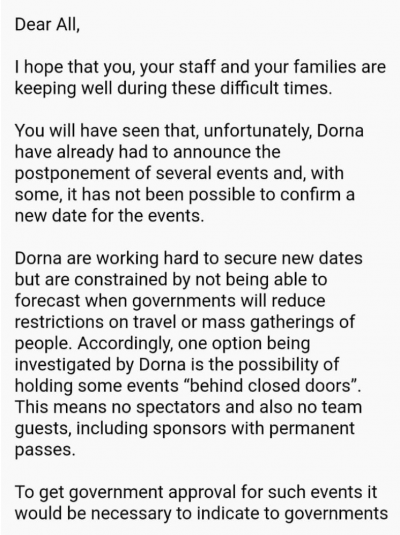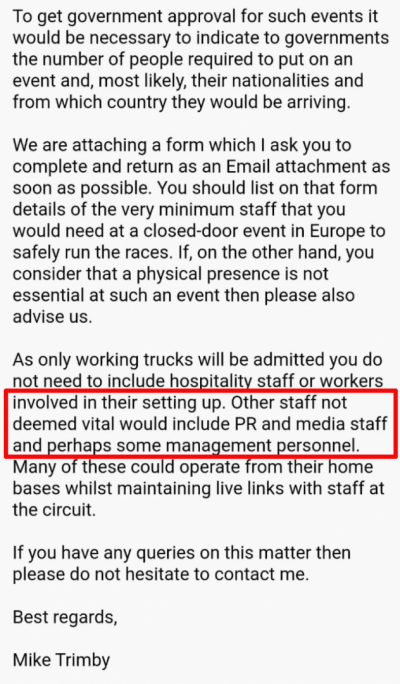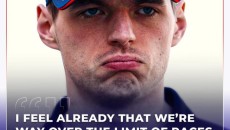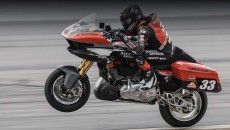More and more these days, the possibility of having a 2020 world championship reduced to the bone seems to materialize. Both for the number of races and for the number of insiders in the paddock. Dorna, as we have been anticipating for some time now in these articles (LINK 1, LINK2, LINK3) has asked the teams to draw up a list of "essential personnel", something it has not done for the press which, should this option prove to be true, would remain cut off from the circuits for the rest of the season. To discuss this matter, we got in touch with Fausto Gresini live (find his interview HERE) and also, via Skype, our colleague in the ‘La Repubblica’ daily newspaper, Massimo Calandri, who is always present - together with GPOne.com - at the Grands Prix all over the world.
What are the risks of running a world championship without journalists and only with television networks?
"The risk is that of having information that is altered and bogus, good information is made by the journalist who can move, gain experience and acquire sources on the ground. If we were to opt for a championship without media, there would be a total absence of dialogue and I believe that for those who make and receive information, it would be a disaster. In recent years, unfortunately, we have seen newspapers and media invest less and less in travelling journalists and this has meant that the possibility of genuine information has been lost. There are those who are satisfied with what the agencies send or what the few who are on the ground publish, then transform it, while there are also some sites that do this by being satisfied only with what you see on TV. "
However, not everyone works in this way, and having a journalist from a national newspaper always at the Grands Prix is important for everyone.
"I recognize the investment that has been made at GPOne, you are always on the ground and this makes you a media benchmark. You can provide your readers with true, live, and independent information. I realize that the expenses are considerable, but it is all a question of give-and-take, you have to invest to give quality information. Watching TV and commenting on the images will be bad, and it is an idea that I do not like at all. Another problem will be the press conferences: should we be satisfied with fixed questions and answers? I am very perplexed and disappointed, maybe our role is decreasing more and more but if we don't want it to happen then it should probably be us and our readers who make our voices felt. "
"At Sepang in 2015 Rossi spoke to journalists, not in the press conference"
Could there be some sort of compromise to allow us to do our job while staying at home? Technology exists and there are many possibilities.
"I'm a little perplexed about this. Few people remember that in 2015 at Sepang, when the Rossi-Marquez case broke out, Valentino in Dorna's conference said one thing halfway referring to Marquez's behaviour. Then it was the reporters who asked for an explanation with the TV cameras switched off and Valentino opened the book with them, and the cameras went back to recording. For press conferences, a sort of smart working could be set up where journalists would be allowed to ask questions from home. "
So, your opinion, apart from the situation of the press conferences, is more a no than a yes ...
“I've already been feeling trapped in these last months. We are fortunate to be able to travel a lot and used to combining work with travel, which then always becomes an adventure. I am always happy when I see that there are many journalists at the events because the competition raises the quality, brings out the news and improves content. Our work, however, does not stop at the press conference, an important part is also wandering around the paddock, in the pits or in the hospitality to collect news and feelings and then better report on the Grands Prix.
"In the world championship a journalist is free"
But do you think the idea of racing behind closed doors and only with the "bare essentials" can be realized?
“I would accept the situation of a GP behind closed doors because it is always better to have a race to see than to have nothing, but I don't know how feasible this will be. I have the impression that the idea of doing everything behind closed doors, bringing only indispensable staff to the paddock is still a plan B. The whole caravan of the world championship has almost 3000 people and even reducing it to the maximum means that it won’t go below one thousand and I think that in the coming months, moving 1000 people will be complicated. "
You have been in the world championship for a long time now, but you also follow other sports. What are your impressions of this world and how has it changed since you entered?
“My first GP was at Barcelona 10 years ago now. I also follow football, rugby and I did some Formula 1 Grands Prix but those are environments where information is a bit ‘gagged’, where you can only ask a certain type of question, at a specific moment and being careful not to mention certain topics. Motorcycling, on the other hand, is an extraordinary world, it is the only place left where a journalist has the opportunity to move freely and to tell stories without any limit and that is why I would like more journalists to have the opportunity to follow it. When I arrived, I was amazed by the passion and generosity of my colleagues even if everyone has to look after himself or herself. It is a special and romantic world and it would be a crime to confine it. Long live the world championship!"










